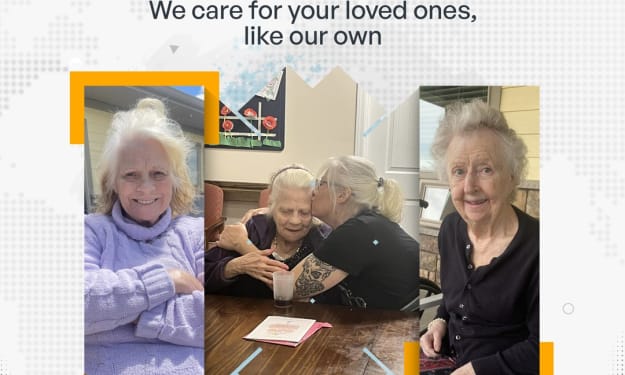Content warning
This story may contain sensitive material or discuss topics that some readers may find distressing. Reader discretion is advised. The views and opinions expressed in this story are those of the author and do not necessarily reflect the official policy or position of Vocal.
"The Impact of Social Media on Mental Health Among American Youth"
Exploring the Effects of Social Media Use on Mental Health Among Young Americans

The rise of social media has revolutionized the way people communicate and connect with each other. Today, social media platforms such as Facebook, Instagram, and Twitter have become an integral part of the lives of millions of people worldwide, especially among American youth. While social media has its benefits, studies have shown that excessive use of these platforms can have a negative impact on mental health, particularly among the young generation.
One of the major ways in which social media affects mental health is by promoting unrealistic beauty standards and a constant comparison to others. On platforms such as Instagram, users often showcase the highlight reel of their lives, sharing pictures of expensive vacations, toned bodies, and seemingly perfect relationships. This pressure to measure up to the curated images of others can cause feelings of inadequacy, low self-esteem, and depression among young people.
In addition to promoting unrealistic beauty standards, social media also exposes young people to cyberbullying. Online insults and harassment can have a serious impact on an individual's mental health and overall well-being. Research has shown that children and adolescents who experience cyberbullying are at a higher risk of developing anxiety, depression, and other mental health problems.
Furthermore, social media can lead to addiction and a lack of balance in daily life. Spending excessive amounts of time scrolling through social media can lead to neglecting duties, relationships, and hobbies, which can lead to feelings of anxiety and stress.
Despite these negative impacts, social media can also have a positive impact on mental health when used in moderation. It can be a way to connect with friends and family, share experiences and ideas, and even seek emotional support from others. Social media can also be used as a tool to raise awareness about mental health issues, reduce stigma, and provide a platform for individuals to share their stories.
In conclusion, social media has undoubtedly changed the way we live and communicate. While the benefits of social media cannot be ignored, it is important to recognize the potential negative impacts it can have on mental health, especially among American youth. Reducing excessive use and promoting healthy social media habits can help mitigate these impacts and promote greater well-being among our young people.
Parents, educators, and mental health professionals can also play a vital role in supporting young people in navigating social media use and building healthy habits. Parents can monitor their children's online activities and limit screen time, while educators can include digital literacy and media literacy classes in their curriculum. Mental health professionals can provide resources and support for young people experiencing mental health problems related to social media use.
In conclusion, it's clear that social media has a significant impact on the mental health of American youth. While social media has its benefits, we must be aware of the potential negative impacts that frequent and excessive use can have on mental health. It's essential to take steps to promote healthy social media habits and encourage young people to seek support when they need it. With the right support and awareness, social media can be a positive tool for connection and empowerment for young people.
Some specific strategies for promoting healthy social media use include setting limits on screen time, encouraging outdoor activities and face-to-face interactions, teaching critical media literacy skills, and practicing self-care and mindfulness. Additionally, it's crucial for young people to have access to mental health resources and support, including therapy, counseling, and crisis hotlines.
Ultimately, it's up to us as individuals and as a society to shape the impact that social media has on our mental health. We must acknowledge the potential harms while also recognizing the many benefits that social media can offer. By working together to promote healthy social media use and support young people's mental health, we can create a more positive and connected world for all.
In conclusion, it's important to recognize that social media is not inherently good or bad; it's a tool that can be used for various purposes. As such, it's up to us to take responsibility for how we use it and shape its impact on our mental health. By adopting healthy habits, staying informed about the risks and benefits of social media use, and seeking support when we need it, we can reap the many benefits of social media while minimizing its potential harms.
As parents, educators, mental health professionals, and community members, we all have a role to play in promoting healthy social media use among young people. By working together, we can create a world where social media is a positive force for connection, empowerment, and mental well-being.
So, what can we do to promote healthy social media use among young people? Here are a few suggestions:
1. Encourage critical media literacy: Teach young people to question what they see on social media and to think critically about the impact it might have on their mental health and well-being.
2. Set limits on screen time: Encourage young people to take breaks from social media and engage in other activities that promote mental health, like exercise and spending time outdoors.
3. Foster face-to-face interaction: Encourage young people to spend time with friends and family in person, as well as to engage in hobbies and activities that don't involve social media.
4. Provide mental health resources: Ensure that young people have access to mental health resources and support, including therapy, counseling, and crisis hotlines.
5. Practice self-care and mindfulness: Encourage young people to take care of their mental health by practicing self-care and mindfulness, such as through meditation or journaling.
By following these strategies and working together as a community, we can help young people use social media in a healthy and positive way.
About the Creator
Enjoyed the story? Support the Creator.
Subscribe for free to receive all their stories in your feed. You could also pledge your support or give them a one-off tip, letting them know you appreciate their work.





Comments
There are no comments for this story
Be the first to respond and start the conversation.